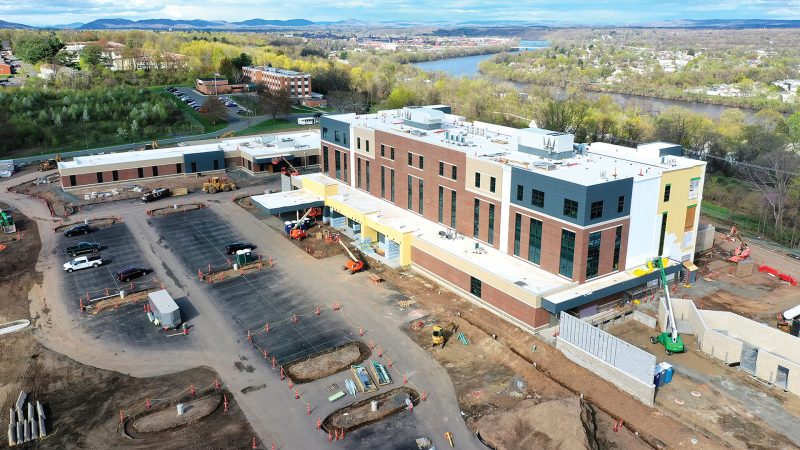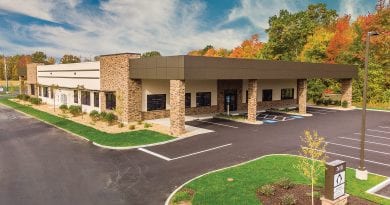Valley Springs Behavioral Health Hospital to Open in Holyoke This Summer
Specialized Approach
By Joseph Bednar bednar@businesswest.com
As Dr. Barry Sarvet surveys Valley Springs Behavioral Health Hospital a couple months before its opening, he’s excited about what he sees.
“We are extremely excited to be providing a brand new, state-of-the-art psychiatric hospital facility for our communities in the Pioneer Valley,” said Sarvet, chair of the Department of Psychiatry at Baystate Health. “Hospital care for behavioral-health patients requires a specialized environment of care to ensure safety, comfort, and privacy for patients and a setting for a full range of therapeutic services to support their recovery.”
The Holyoke-based hospital does just that, he noted. “Our new facility is spacious and will have an abundance of natural light. It includes ample spaces for psychotherapy, rooms for art and occupational therapy, a gymnasium for physical activity and recreation, and access to outdoor spaces for fresh air. Psychiatric patients deserve to be treated in an environment of care that supports their dignity, and we’re so pleased to be able to offer this.”
But he’s just as excited, if not moreso, about what the hospital, a joint venture between Baystate Health and Lifepoint Behavioral Health, means for access to behavioral healthcare in the region, which still faces a shortage of inpatient psychiatric services and increasing mental-health needs.
“We care deeply about people who need psychiatric services and are committed to the success of this new project,” he said, adding that the partnership with Lifepoint is smart considering that organization’s expertise in the development of new specialty hospitals and its commitment to quality care. “In developing this new hospital with our Lifepoint partners, we are continuing and enhancing our commitment to fulfilling the mental-health needs of people in our region.”

“Hospital care for behavioral-health patients requires a specialized environment of care to ensure safety, comfort, and privacy for patients and a setting for a full range of therapeutic services to support their recovery.”
Dr. Barry Sarvet
Baystate actually announced a partnership on this project with Kindred Healthcare LLC during the summer of 2000, before Kindred was purchased by Lifepoint Health about a year and a half ago. Lifepoint boasts more than 100 specialty hospitals across the U.S. focused on four divisions: skilled nursing, rehabilitation, acute care, and behavioral health, said Roy Sasenaraine, CEO of Valley Springs.
“There’s a significant need in Western Mass. for this specialized hospital. The behavioral-health needs in the population are so great, and the differentiation between this service line and every other service line is so different, you need something like this; just like having a specialty hospital for children, you need a special team to come together to care for behavioral-health patients.”
The new facility, set to open in mid-August, will increase capacity for inpatient behavioral healthcare for adults, children, and adolescents in the area by 50%. Built with the unique needs of behavioral-health patients in mind, the $72 million hospital is designed so patients receive their care and treatment in an environment that supports their recovery, Sasenaraine said.
The 150-bed hospital at 45 Lower Westfield Road in Holyoke, including 30 beds dedicated to longer-term care through the Massachusetts Department of Mental Health, has been planned with patient safety in mind, he added.

“The new building allows us to make use of modern technology to elevate patient safety in a way retrofitting an existing unit could not.”
Roy Sasenaraine
“A benefit of new construction is that patient safety and privacy has been factored into every aspect of the building, from patient rooms to the gymnasium. We have fine-tuned every detail and thought of everything in terms of safety: toilets, window blinds, even door jambs. The new building allows us to make use of modern technology to elevate patient safety in a way retrofitting an existing unit could not.”
Access Points
A new service offered by Valley Springs Behavioral Health Hospital will be on-site evaluations following a provider referral, allowing some patients to be admitted without an Emergency Department visit at a different hospital.
Currently, around one-third of the behavioral-health patients evaluated in Baystate Health’s four emergency departments are transferred to facilities outside of Western Mass. due to a shortage of psychiatric beds in the region. With the opening of Valley Springs, more patients will have the opportunity to receive treatment close to home, Sasenaraine explained. The hospital’s location is intended to provide accessibility, being close to Routes 90 and 91, while also providing a facility focused solely on specialized care for mental health.
He explained that patients will be admitted in three ways: people in crisis can be taken directly to the hospital by ambulance, other care providers will refer patients in need of behavioral-health treatment, and people can also walk in off the street.
“They might say, ‘I think I need help. I’m suicidal.’ That’s what my intake-assessment team is here for, to assess them for clinical issues, suicidal ideations, whatever it may be.”
Sasenaraine also noted that the new facility will provide employment opportunities with the opportunity to positively impact the lives of patients and families in the community. Employees currently working in Baystate facilities whose services will be transferred to Valley Springs Behavioral Health Hospital will have the opportunity to apply for positions there, in addition to opportunities for new employees to be a part of the joint venture.
“We’ll employ a lot of people, even some departments that didn’t exist before,” he said, such as a 24/7 intake department that will provide 18 full-time equivalent jobs. “For many people, this will be a once-in-a-lifetime opportunity to be a part of building a new organization from the ground up.”
Behavioral-health services from Baystate Wing Hospital and Baystate Noble Hospital, as well as pediatric behavioral-health services from Baystate Medical Center, will begin to transition to the Valley Springs site in August. Spaces in those facilities will then be converted to primary and specialty care or will be used to accommodate the increasing demand for inpatient medical services.
Baystate Health is working closely with the Department of Public Health (DPH) during this transition. The affected inpatient facilities are expected to be fully transitioned by the end of the year, with most completing the move in the fall, and partial hospitalization programs transitioning by January 2024.
As Baystate Health works with DPH to facilitate the transition, a series of formal notices will be made, public hearings will be held, and DPH will work with Baystate Health to assure patient-access needs are met. This process has already begun, about four months before the intended full transition for each affected unit, starting in late May for Baystate Wing, mid-June for Baystate Medical Center, and late June for Baystate Noble Hospital; it will continue in July for the partial-hospitalization program at Baystate Franklin Medical Center.
Valley Springs Behavioral Health Hospital will be affiliated with the psychiatric services operated directly by Baystate Health, including a 28-bed Adult Psychiatric Treatment Unit at Baystate Medical Center, which serves as a primary site of training for medical students and psychiatric residents within UMass Chan Medical School – Baystate educational programs. This unit has a unique role in the care of patients with co-occurring and complex medical issues, requiring the resources of a general hospital.
Baystate’s Department of Psychiatry will also continue to operate its array of ambulatory behavioral-health services, psychiatric consultation services, emergency psychiatric services, and programs supporting mental-health treatment in the primary-care setting.
In addition, Baystate Health will continue to operate its 22-bed Mental Health Unit at Baystate Franklin Medical Center, which provides inpatient behavioral healthcare for patients in Greenfield and the surrounding communities. According to Ronald Bryant, president of Baystate Regional Hospitals, the decision to keep this unit open was made based on geography and Baystate Franklin’s history of integration of behavioral-health services, such as the 24/7 presence of recovery coaches in the Emergency Department.
“Baystate Franklin has spent many years building strength in behavioral-health practices that really connects with a lot of the other types of care provided,” Bryant said. “We didn’t want to lose the continuity of that integration.”
Fulfilling a Mission
Before coming to Valley Springs, Sasenaraine served as vice president of Operations for the central region of Spire Orthopedic Partners, where he led new construction, patient-access initiatives, and acquisition and integration work for Spire’s nine locations in Connecticut.
Prior to that, he served as vice president of Operations for Hartford Healthcare System’s East Region behavioral-health network, where he oversaw 18 locations, including six school-based programs, two emergency departments, one inpatient psychiatric hospital, eight ambulatory locations, and one inpatient juvenile program. His leadership led to the implementation of a new care model for adolescent, pediatric, and adult patients in inpatient care, along with the implementation of a new electronic medical record across all sites of care.
“Roy’s breadth of operational experience and his deep understanding of the behavioral-health setting make him the right leader for this new, state-of-the art facility that we are excited to open in the coming months,” Dr. Andrew Artenstein, Baystate Health’s chief physician executive and chief academic officer, said when the appointment was announced in the spring.
For his part, Sasenaraine said he embraces the opportunity to oversee a new specialty hospital that will increase employment in the region and generate $1.6 million in taxes annually — but, most importantly, provide more access to behavioral healthcare at a time when it’s needed.
“I know that we have an exciting road ahead of us,” he said. “I look forward to serving patients in Western Massachusetts with safe, high-quality behavioral-healthcare services.”




